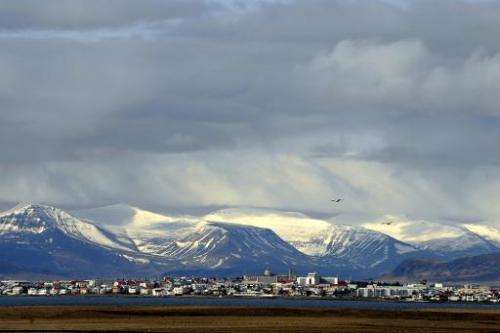A general view shows the southern end of Reykjavik on April 26, 2009
An Icelandic environmental group poured cold water over the Arctic nation's dreams of becoming an oil-producer Wednesday, following the approval of a Chinese-led exploration bid off the country's north coast.
"Iceland should not bet on oil at a time when it is doubtful that humanity can reach its (greenhouse gas) goals," Arni Finnsson, chairman of Iceland Nature Conservation Association, told AFP.
"There are few indications that production of oil in the Dreki Area will be cost-efficient," he added, echoing speculation from industry analysts that Iceland's venture into the offshore oil business could be fraught with difficulties.
China's state-owned oil company CNOOC International obtained an Arctic exploration licence in January for the remote Dreki Area, 125 miles off the north coast—the third licence granted since bids were invited in 2009—along with Icelandic firm Eykon Energy and Norway's state-owned Petoro.
Iceland, still recovering from the financial crisis of 2008-2009, hopes to follow in neighbouring Norway's footsteps and build a lucrative oil industry.
"That is the hope," said Thorarinn Sveinn Arnarson, who heads the hydrocarbon licensing department at Iceland's national energy authority.
"If something is found that is economically viable there would be tax benefits and of course all the other things, job creation and technical capacity like we've seen in Norway and in the Faroe Islands."
But that vision could be some way off, if it ever materialises, said Dag Claes, a leading oil and gas expert at the University of Oslo.
"The Icelanders have been pushing for this as a result of their financial crisis but we're a bit reluctant about the area—it's quite remote," he said.
He cited "pretty strict" environmental rules on construction on Jan Mayen, a strip of Norwegian-owned volcanic rock north of Iceland where investors might want to build airstrips and other facilities.
"Infrastructure development would probably have to be on the Icelandic side ... But they're starting from scratch. It's an enormous challenge to develop an oil industry. It would take at least ten years," Claes said.
However that will not stop Iceland from trying its luck.
"We don't know if there's oil there but we're exploring and the licensed companies are taking the risks. The Icelandic state isn't taking any financial risk in this," Arnarson said.
According to a study by the US Geological Survey from 2008, the Arctic could hold 13 percent of the oil and 30 percent of the natural gas still to be discovered in the planet.
The melting of the ice cap also offers shorter shipping routes between the Pacific and the Atlantic oceans.
This has attracted the interest of countries like China which has sought closer ties with Iceland in recent years and maintains a large embassy in the country's capital Reykjavik.
© 2014 AFP
























